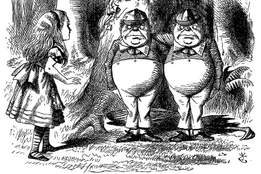
‘Courage’
Lookups for courage were in the top ten on Monday morning, possibly because the word featured heavily in reporting on the “Hands Off” protests held across the country over the weekend.
Several thousand people turned out on an unusually warm April Saturday for a series of rallies across Hampton Roads to protest the Trump administration and Elon Musk’s Department of Government Efficiency moves to cut federal spending and roll back protections for minority groups. … “(My fellow service members) didn’t wait for someone else to solve the problem, we ran towards the fire ... and now my friends, brothers and sisters in arms, and families who stood with us through it all, it is once again time to act,” Montiero said. “Not with weapons but with courage, not in the field of combat but in the public square.”
—Gavin Stone, The Virginian-Pilot (Norfolk, Virginia), 6 Apr. 2025
The size of the protests was bolstered by strong turnout in more conservative rural areas. Cheryl Campbell, who helped organize a gathering of about 300 in La Grande, said it’s easier to stay silent when the majority of those around you disagree with you. “It takes more courage to speak up here,” Campbell told the crowd on Saturday, “where many of our neighbors voted for Trump.”
—The East Oregonian (Pendleton, Oregon), 6 Apr. 2025
Courage refers to mental or moral strength to venture, persevere, and withstand danger, fear, or difficulty. The word entered Middle English from the Anglo-French curage, which in turn comes from quer or coer, meaning “heart.”
‘Kafkaesque’
Kafkaesque became one of the week’s top lookups after appearing in a brief to the US Supreme Court written by the attorneys for a Maryland man, Kilmar Abrego Garcia.
The Government knew about the court order prohibiting Abrego Garcia’s removal to El Salvador, and admits that removing him in violation of that order was an “administrative error.” ... Abrego Garcia has never been charged with a crime, in any country. He is not wanted by the government of El Salvador. He sits in a foreign prison solely at the behest of the United States, as the product of a Kafka-esque mistake.
—Andrew J. Rossman et al, Counsel for Respondents, 7 Apr. 2025
A Salvadoran migrant and metal worker in Maryland ... was arrested by immigration authorities in March and deported to one of the notorious prisons of his homeland, in contravention of a U.S. immigration judge’s order. The government acknowledged the “administrative error”—an Orwellian euphemism for a Kafkaesque nightmare—but petitioned the U.S. Supreme Court to overturn a federal judge’s order requiring his return on Monday.
—Bret Stephens, The New York Times, 8 Apr. 2025
The adjective Kafkaesque describes things that are of, related to, or suggestive of Franz Kafka or his writings, especially things that have a nightmarishly complex, bizarre, or illogical quality. Franz Kafka (1883-1924) was a Czech-born German-language writer whose surreal fiction vividly expressed the anxiety, alienation, and powerlessness of the individual in the 20th century. The opening sentence of his 1915 story The Metamorphosis has become one of the most famous in Western literature (“As Gregor Samsa awoke one morning from uneasy dreams he found himself transformed in his bed into a gigantic insect”), while in his novel The Trial, published a year after his death, a young man finds himself caught up in the mindless bureaucracy of the law after being charged with a crime that is never named.
‘Facilitate’
Lookups for facilitate were also high this week in conjunction with news about Kilmar Abrego Garcia, when the Supreme Court ruled against the Trump administration’s emergency appeal.
The Supreme Court on Thursday rejected the Trump administration's emergency appeal and ruled that it must facilitate the return of a Maryland man who was mistakenly deported to El Salvador, despite a court order barring his removal.
—Gabe Whisnant, Newsweek, 10 Apr. 2025
To facilitate something is, broadly, to make it easier. More specifically facilitate can mean “to help bring (something) about” or “to help (something, such as a discussion) run more smoothly and effectively.”
‘Bear market’
Bear market was also trending this week.
President Trump uprooted investors last week with the announcement of tariffs on countries across the world. Significantly higher American import taxes on goods from dozens of other countries took effect on Wednesday. On Tuesday, the S&P 500 ended near a bear market, which is a 20 percent drop from a recent peak —a symbolic, and relatively rare and worrisome, threshold for investors. It closed 18.9 percent below its mid-February record, having plunged more than 12 percent just in the days since Mr. Trump announced his new tariffs.
—Joe Rennison and River Akira Davis, The New York Times, 9 Apr. 2025
Bear market refers to a market in which securities or commodities are persistently declining in value. We define the relevant sense of bear as “someone who sells securities or commodities in expectation of a price decline.” This use of bear comes from an old proverb warning that it is not wise “to sell the bear’s skin before one has caught the bear.” By the eighteenth century, the term bearskin was being used in the phrase “to sell (or buy) the bearskin” and in the name “bearskin jobber,” referring to one selling the “bearskin.” Bearskin was quickly shortened to bear, which was applied to stock that was being sold by a speculator and the speculator selling stock. The bear sold a borrowed stock with a delivery date specified in the future. This was done with the expectation that stock prices would go down and the stock could be bought back at the lower price, with the difference from the selling price kept as profit.
Word Worth Knowing: ‘Thalweg’
Thalweg refers to the middle of the chief navigable channel of a waterway (such as a river) which constitutes the boundary line between states. It can also refer to a line following the lowest part of a valley, whether under water or not; the line of continuous maximum descent from any point of a land surface or one crossing all contour lines at right angles; or subsurface water percolating beneath and in the same direction as a surface stream course. The word is a German borrowing, from Tal, meaning “valley,” and Weg, meaning “way, path.”
The Corps had been working on a plan to buy land to dump the sand that was gradually piling up, said Kirk Hansen, Mississippi River regional supervisor at the Iowa Department of Natural Resources. The Corps suggested putting it in the thalweg of the river—a term for the deepest and fastest-moving section of water. The state of Wisconsin objected; the sand landed on an Iowa riverbank.
—Chloe Johnson, The Star Tribune (Minneapolis, Minnesota), 24 Dec. 2023




